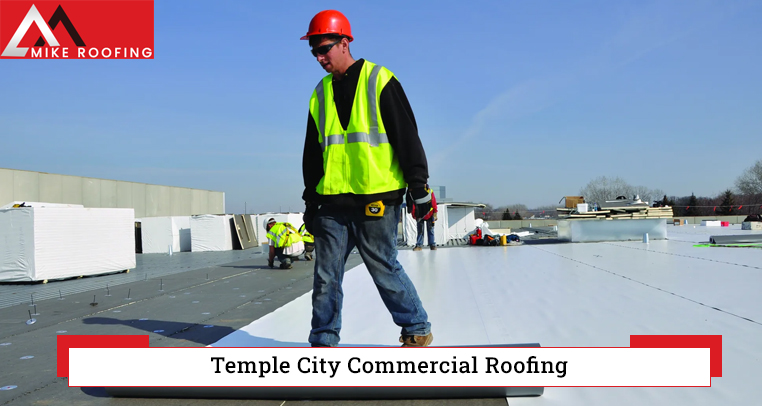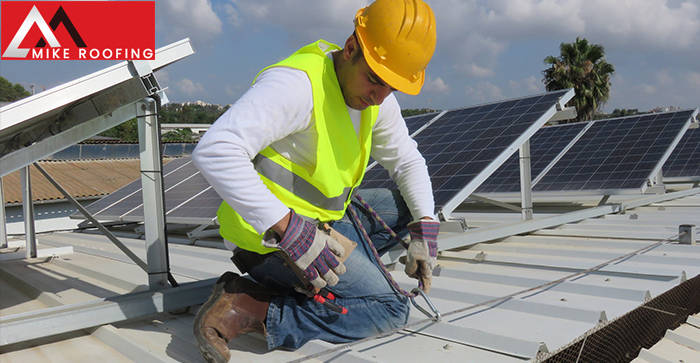It is often recommended that you get specialized services for your Temple City commercial roofing needs. This is primarily because commercial roofs have a range of different features that are exclusive to them. Here are some of them

Commercial roofs are commonly flat or have low slopes, allowing for more efficient use of space and installation of rooftop equipment such as HVAC systems, solar panels, or satellite dishes.
Commercial roofs tend to cover larger surface areas compared to residential roofs. This requires specialized installation techniques, material handling, and equipment to accommodate the size and scale of the roof.
Commercial roofs often have numerous penetrations for vents, ducts, pipes, and other equipment. Proper sealing and flashing around these penetrations are critical to prevent leaks and maintain the roof’s integrity.
Commercial roofs may include designated walkways, access points, and safety features to facilitate maintenance, inspections, and repairs. These features ensure safe and efficient access for workers and help prevent damage to the roof surface.
Commercial roofs typically have more complex drainage systems, including gutters, downspouts, and internal drains, to efficiently channel rainwater and prevent pooling or water damage.
Due to stricter building codes and fire safety regulations for commercial buildings, commercial roofs often incorporate fire-resistant materials and designs to ensure compliance with local regulations.
| Roof Membrane | Installation | Installation of the primary roofing membrane | Weeks to Months |
|---|---|---|---|
| Inspection | Assessment of the membrane’s condition and integrity | Hours to Days | |
| Repair | Patching or sealing damaged areas or leaks | Hours to Days | |
| Replacement | Removal and replacement of the entire membrane | Weeks to Months | |
| Roofing Materials | Selection and Installation | Choosing and installing appropriate roofing materials | Weeks to Months |
| Inspection | Assessment of the condition and integrity of the individual units | Hours to Days | |
| Repair | Fixing leaks, cracks, missing shingles, etc. | Hours to Days | |
| Replacement | Replacing the entire roofing material | Weeks | |
| Roof Coatings | Application | Applying protective coatings to extend roof life | Days to Weeks |
| Inspection | Checking coating integrity and effectiveness | Hours to Days | |
| Repair | Patching or recoating damaged or worn areas | Hours to Days | |
| Replacement | Removing and reapplying a new coating system | Days to Weeks | |
| Roof Flashing | Installation | Application of flashing materials at roof transitions | Days to Weeks |
| Inspection | Checking for loose or damaged flashing | Hours to Days | |
| Repair | Repairing or replacing damaged flashing | Hours to Days | |
| Roof Drainage | Installation | Installation of gutters, downspouts, and drains | Days to Weeks |
| Inspection | Examination of drainage system functionality | Hours to Days | |
| Repair | Clearing clogs, fixing leaks, or replacing components | Hours to Days | |
| Replacement | Upgrading or replacing the entire drainage system | Days to Weeks |
The specific permits required for Temple City commercial roofing projects may vary based on local regulations and the scope of the project. Get in touch with our roofing company in Temple City to get permits hassle free. Here are some common permits that may be necessary:
This permit is typically required for any construction or alteration work, including commercial roofing projects. It ensures compliance with building codes and safety regulations.

A specific permit for roofing work, which may include installation, repair, or replacement of the commercial roof. It ensures that the roofing work meets the necessary standards.
Depending on the zoning regulations of Temple City, a zoning permit may be required to ensure that the commercial roofing project aligns with the designated land use and zoning requirements.
In some cases, commercial roofing projects may require environmental permits, particularly if there are environmental concerns or if the project involves handling hazardous materials.
If the commercial roofing project involves electrical or plumbing work, separate permits may be required to ensure compliance with electrical and plumbing codes.
If the roofing project requires the closure or obstruction of public streets or sidewalks for material delivery, equipment setup, or safety reasons, a permit may be required to ensure proper traffic management and pedestrian safety.
If a crane or other heavy equipment is needed for lifting and maneuvering roofing materials, a permit may be necessary to ensure compliance with safety regulations and proper operation of the equipment
Depending on the local regulations and the specific roofing project’s noise levels, a noise permit may be required to perform roofing work during certain hours or in noise-sensitive areas. This helps to minimize disruption to surrounding businesses or residents.
In some cases, a fire department permit may be necessary if the roofing project involves open flames, hot works, or any activities that could potentially pose a fire hazard. This permit ensures compliance with fire safety regulations.
If temporary signage or banners need to be installed during the roofing project for safety warnings, directional signage, or project identification, a permit may be required to ensure compliance with local sign regulations
Some common types of commercial roofing materials used in Temple City include TPO (Thermoplastic Olefin), EPDM (Ethylene Propylene Diene Monomer), PVC (Polyvinyl Chloride), modified bitumen, metal roofing, and built-up roofing (BUR).
Whether commercial roof repairs are covered by insurance depends on your specific insurance policy and the cause of the damage. It is important to review your insurance policy and consult with your insurance provider to understand the coverage details.
The lifespan of a commercial roof can vary depending on various factors such as the type of roofing material, installation quality, and maintenance. However, on average, commercial roofs can last between 15 to 30 years.